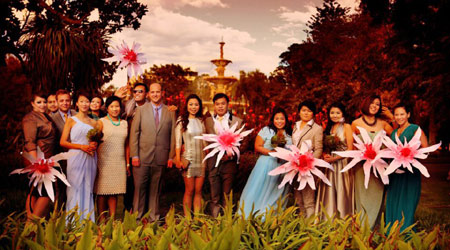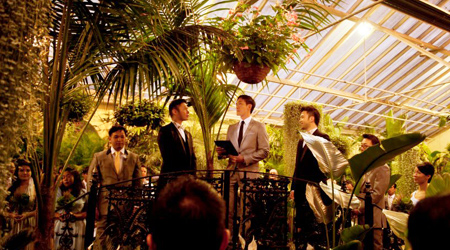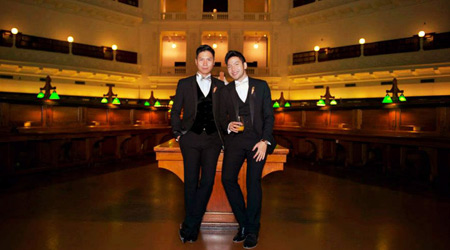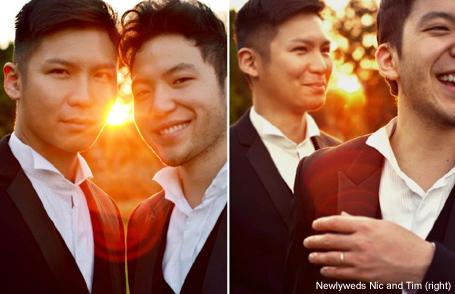Once upon a time, two men met at a party in Singapore, as men sometimes do… Glances were exchanged, phone numbers, email addresses… 10 years later, in April this past year, these same two men got married in Melbourne, Australia. Nic, 33, was born in Singapore, and Tim, 30, in Australia. Both are of Singaporean Chinese heritage.
They released a video documenting their wedding on Youtube, and contacted Fridae to share their story with us. I met up with Tim and Nic on a cold wintry afternoon for lunch in Melbourne CBD, to learn more.
“We’re gay, we’re Christian, we’re Asian,” Tim asserted, stressing that these are not contradictory identities.
“We’d like to put an Asian face to an issue that has been couched as a very ‘Western notion.’ Gay people come from every single culture and ethnicity. We’d like to be able to say that we’ve done this, and maybe some other Asian couples might take the next step.”
“It’s about being visible,” Nic told me, “there are many other Singaporeans who hold probably quite small, closed events celebrating their relationship, but they’re not like us… they’re not out, telling the whole world. We got our families there, putting ourselves on the internet. My intention is about visibility.”
Congratulations to you both, Tim & Nic! Thank you for your courage, your honesty, and for sharing your story with us all.

All photos courtesy of Nic and Tim
Celebration despite lack of legal recognition
Even though same-sex marriage is still not recognised under Australian law (civil unions are permitted in the Australian Capital Territory, Tasmania and Victoria), when I asked them about why they would still decide to hold a ceremony, Nic told me, “This is about a celebration of our relationship.”
Indeed, one of the most moving things about watching the footage of their ceremony on Youtube, is seeing other Asian faces: friends and family who joined them as part of their ceremony, celebrating with them, moved and inspired by them, some even to tears.
Like many people making the pledge to go through holy matrimony, Tim experienced at first some “anxiety about marriage and in making such a public commitment.” No matter ethnic or cultural background, no matter their sexual orientation, this was about expanding the contours of their relationship, and pushing themselves to “the next level.”
The extraordinary thing about this, in this sense, is how perfectly ordinary this is…
After all, even without legal marriage, Nic & Tim are doing that which gay people have been doing for awhile; simply loving one another, and inviting our loved ones to witness the reality of our exposed hearts. Tim tells me that the whole marriage itself was a “rite of passage,” and Nic added that this has cemented their relationship with one another while also reconnecting and uniting them with friends and loved ones.
Tim tells me, “It was one of the best moments of my life.”

Nic and Tim were married by Free Community Church (Singapore)
Pastor Gary Chan
Asian identity
Tim and Nic discussed how disappointing it is that, of course, no Asian countries have as yet legalised same-sex marriage either, with Douglas Sanders’ most recent Fridae article suggesting that the countries that come closest to this would be Taiwan and Nepal.
At the same time, they are clear about not over-valourising ‘Western’ countries.
Within the context of Australia, they say: “You see images and videos of people making a difference – making a stand for how timely it is to be giving recognition to relationships such as ours. But I hardly see any Asian faces in the mix.
“It's strange – this concept of an Asian same-sex wedding – like the community views us as not Asian enough or that our sexual preferences are damaging the racial profile. And on the other hand, there is this invisibility to the Asian community in Australia – we are like the wizarding community of the Harry Potter universe – living side-by-side in this parallel world that somehow see us saunter past each other in the streets…”
“But,” Tim adds, “if we are suspect Asians, I wonder if this gives us the ability to be ambassadors at the fringe, calling for greater awareness and acceptance?”
The point of holding their ceremony was not to typify the existence of gay men within a ‘Western’ setting, but indeed, to send a message for Asian people to see that yes, this is possible for us, no matter who we are or where we are at.
There is, of course, no one way to be Asian. The word ‘Asian’ itself can be misleading. It overgeneralises an incredibly diverse range of cultures and peoples, who only vaguely share a sense of history in common.
Much of Asia itself has historically been colonised by disparate forces, from the Mongolian Genghis Khan across China, including Tibetan territory, to the Han Chinese influence throughout East and Southeast Asia with Confucian values, to the Japanese attempt at colonisation during World War II, to the Khmer empire, to the British, French, Portuguese, and Dutch reaching many shores in the past 500 years.
Even that, of course, is changing, as people of Asian descent have been migrating out of Asia, all around the world for a few centuries now as well. Many of us speak non-Asian languages as our primary language. And of course, conversely, now Asian cultural and religious influences are very common in ‘Western’ countries… such as in the popularisation of kung fu, yoga, and Buddhism.
Singapore, of course, is a peculiar example of an Asian country… It stands out as being the only country where national education is conducted in most schools in English, and so we have a country which has, in many ways, succeeded at integrating some of the most visible markers of both “Western” and “Eastern” ideals, while simultaneously and slowly dissolving any meaningful distinction between these two terms.

Trailblazing
I’ll be honest. Things are not looking too good for the institution of marriage. At the same time that same-sex couples are campaigning in countries the world over for relationship recognition, heterosexuals are leaving their marriages in droves.
While the exact figure of divorce rates vary from country to country, for those like myself who have been partially raised in ‘Western’ countries like the USA and Australia, I cannot help but be impacted by this statement, almost a proverb: ‘1 in 2 marriages end in divorce.’ It is a chilling and damning statement about marriage. It really does lend one to cynicism.
Not to mention that the history of marriage has been about far more than just romantic ideals. We hear that marriage has been about control of sexuality, about regulating the raging male libido, about managing inheritance and land, about the exchange of women as property. Indeed, as far as gender goes, marriage is often experienced as more liberating for men than for women, easily evidenced by seeing that, on average, women recover much sooner and thrive much more quickly after a divorce when compared to men.
But of course, same-sex couples do not even have the luxury of that sort of misery (yet). We have the opportunity, as gay people, to revive or reject, renew or indeed, even reinvent the meaning of marriage.
The additional reality is, across all cultures, same-sex couples have always existed, and have been recognised in many diverse ways. Many cultures have had configurations of family and kinship that are quite different from those we take for granted in many middle-class Western and Asian countries. These include matriarchal and lesbian ones, where it is women who tend to be householders, own property, who may have a wife, etc., to ones where one woman marries two brothers (e.g. Tibetan ‘fraternal polyandry’) to ones where men get married to women, but are even expected to have male concubines on the side to prove their virility (e.g. some Emperors of China)…
The sad thing is how most images we get exposed to in mainstream media tend toward exclusive heterosexuality, but this is no indictment of the extent to which same-sex couples have always found spaces where our love for one another could be consecrated and recognised by loving friends and family.
In this sense, then, Nic & Tim are lineage-holders, as much as they are trailblazers…
They both clearly recognise the power that their story could have in inspiring others, and so they have bravely volunteered to share it with us. It is such a privilege to hear Nic and Tim’s story, and to share in their joy. That we too can aspire to share our love with our own families, and to dare to call for love, acceptance, and celebration in return.
As Tim said: “If there’s an Asian little kid out there, and he’s struggling with his sexuality… Rather than saying ‘It gets better,’ I want to say, ‘Here is our wedding!’ It was moving, and people came, and we were really blessed with kindness… Here you go, just watch this video!”
Shinen Wong is an educator on issues of gender and sexuality, sexual health and social justice. He has worked in health promotion and culturally diverse community development. He enjoys hot chocolate when it's cold, and cycling even when it's raining. Shinen lives in Melbourne, Australia.

